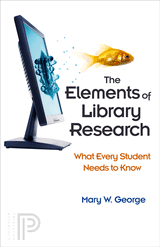
The Elements of Library Research: What Every Student Needs To Know
Mary W. George
©2008 Princeton University Press
GVPL call number: 025.524 GEO
Yes, I read this for fun. The list on the left, Currently Inhabiting My Head, is simply a list of what I've been reading--all of it, except for magazine articles and newspapers. There are no novels for relaxation, or books of poetry hidden away. What you see on the list is my leisure reading.
So why read a book about doing research? I picked this up just to see what Ms. George had to say, and maybe to remind myself of some aspects of reading for information that I've forgotten. And its a good thing I did--this is a terrific book.
Mary George writes accessibly and well, this book intended to serve as a introduction to the library research paper for university and college freshmen. Although it would certainly serve the same function for bright high school students.
The book is fairly short--the main content runs about 144 pages, and then is followed by five appendices, a glossary, selected bibliography, and an index. But in those 144 pages, Ms. George builds a structure that should help take the fear out of writing a paper. Most importantly, she reiterates that professors and librarians not only will help direct and guide, but want to help. In my experience, she may not have emphasized this enough; reference librarians do what they do because they really love finding stuff out and want you to share that excitement.
Much of what Ms. George writes about are approaches to the library that I've so internalized that I would never have thought to mention them; such as looking at the books on either side of the one you were looking for in the stacks (because they are filed by subject and will likely contain information you want to know). On the other hand, she did remind me that I don't make sufficient use of the online databases available through our local library system. But most importantly, Ms. George expands on techniques for locating information. The few words she writes on George Boole and John Venn--and what they are remembered for (Boolean searching and Venn diagrams)--clarifies why Boolean searching works so well: the more terms you enter, the tighter the search results. Coupled with her explanations of more advanced search techniques (and the recommendation to ask the librarian for assistance) certainly pointed me in the direction of better research.
This is an excellent book. A quick read for those experienced in library research just, like me, looking to remind themselves of procedures and approaches they may have forgotten, and a useful reference for those new to serious library use.
Powered by ScribeFire.



No comments:
Post a Comment